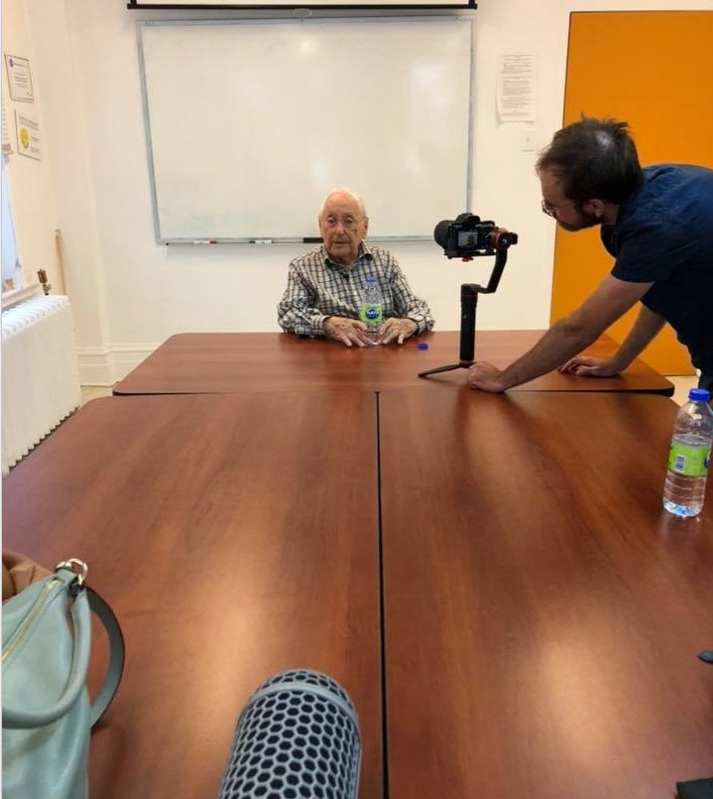Module 1: Oral History
Listening to Survivors

In this section, we will think about the particular dynamics and challenges of listening to Holocaust survivors recount their lives. Holocaust scholars, oral historians, and others who have spent decades listening to and contemplating these narratives have reflected on the difficulties of truly hearing and understanding what survivors have to tell us, as well as the ethical and political issues that contextualize their retellings. From the fundamental challenge of making a life experience into a “story” that is tellable, to the dangers of remembering publicly in the digital age, listening to survivors requires deep engagement and an appreciation for the complexities of their memories and their interpretations.
Listening to Survivors: How do we make meaning from narratives of the Holocaust?
In this lecture, Dr. Anna Sheftel discusses what it means to listen to the stories of Holocaust survivors and the process of interpreting and making meaning from their experiences.
Excerpt from Fateless
Imre Kertesz’s novel Fateless (sometimes translated as Fatelessness) recounts a young Hungarian teenager’s Holocaust experience, from his capture in Budapest, to his time in Auschwitz and Buchenwald, to his return to Budapest. The novel is based on Kertesz’s own Holocaust experience, and it grapples with the difficulties of representing what it means to have survived these camps. Kertesz focuses on the question of time, as in the day to day and constancy of the experience. He insists on the ways in which the camp and one’s captivity within it become one’s ordinary life, thereby resisting abstraction and platitudes about suffering, and forcing us to confront the Holocaust as something that encompassed his entire existence, from the most mundane details to the most painful moments. He asks for us to look closely, and to feel how the passing of time is part of the torture.
This excerpt is drawn from the end of the novel, when the narrator is liberated from Buchenwald and returns to Budapest. It describes the encounter the narrator has with a journalist, which gets to the heart of the many tensions around how survivors see their experiences versus what listeners want to hear.
Questions on Fateless:
- Why does the narrator become so frustrated with the way the journalist talks about the camps?
- What is the journalist getting wrong?
- How does the narrator talk about time and what is its significance in trying to understand the experience of the camps?
- Why does the narrator resist characterizations of the camps as “hell” or “unimaginable?”
Guest Lecture: Henry Greenspan
Dr. Henry Greenspan is an oral historian, psychologist, playwright, and Professor Emeritus at the University of Michigan in Ann Arbor, who specializes in writing and teaching about Holocaust survivors and testimony. In this guest lecture, Dr. Greenspan discusses his experience interviewing Holocaust survivors and discusses the importance of collaborative inquiry when listening to survivor testimony.
Keynote for “Holocaust Remembrance and Representation,” a conference to aid planning the first Holocaust museum in Sweden, Stockholm, 2020.
Guest Lecture: Klaus Mueller
In this lecture, Dr. Klaus Mueller shares his personal journey towards finding gay survivors and developing a relationship of trust with them that allowed them to share their story, often for the first time. Dr. Mueller talks about the necessity for deep listening, flexibility, and attention to survivors’ particular needs when interviewing homosexual survivors of the Holocaust. He explains how he learned from his interviewees how he had to listen to these stories.
Oral History: Leslie Vertes
Leslie Vertes, born in 1924 in Ajak, Hungary, was drafted into forced labour service in 1944 in Budapest, Hungary. After six months, Vertes was able to escape and went into hiding in Budapest. When Budapest was liberated in 1945 by the Soviet army, Vertes was deported from Hungary for forced labour in the Soviet Union. After two years of forced labour, Vertes returned home to Hungary, eventually immigrating to Montreal in 1957 after the 1956 Hungarian revolution. In this clip, Leslie shares an experience of nearly being killed while in hiding in Budapest, and reflects on how and why he communicates his experience the way he does.
Questions for Reflection:
- Why does Leslie Vertes talk about being “born four times?”
- How does he balance trying to communicate the truth of his experience with “making it a story”?
To learn more about Leslie’s life and Holocaust experience, click here to visit the Azrieli Foundation’s Re:Collection and here to learn more about Leslie’s memoir, Alone in the Storm.
Oral History: Lisa Cohen
Lisa Cohen is the daughter of Bryna Wallace, whose testimony we watched earlier in this module. In this clip, Lisa reflects on her mother’s reluctance to speak publicly about her story.
Questions for Reflection:
- How does Lisa Cohen balance her concern for her mother’s wellbeing in recounting with her agency in telling her own story?
Interactive Map
To learn more about Lisa’s family history, press on the menu button on the top left of the interactive map below. You will then be able to scroll down and click on the different icons.
This interactive map was created by Nicola Woodhead, a PhD candidate in History at the Parkes Institute at the University of Southampton, UK.

